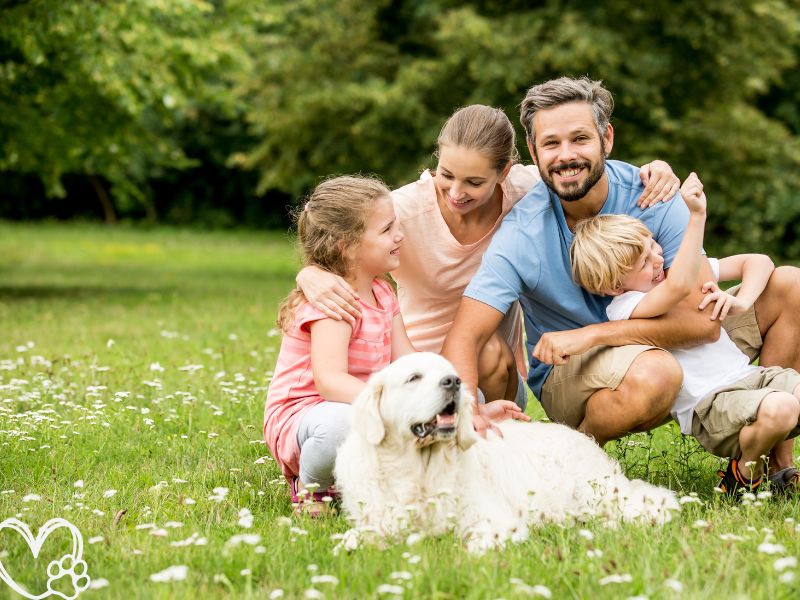Families. Hey there, fellow parents and pet enthusiasts! If you’re thinking about adding a four-legged friend to your family, you’ve probably wondered which dog breed might be the best fit, especially when you have kids in the mix. Choosing the right dog is about more than just falling for those puppy dog eyes; it’s about finding a breed that meshes well with your family’s lifestyle and energy. From providing companionship to helping your kids learn responsibility, the right dog can really enhance your family life. So, let’s dive into what makes a dog breed great for families with children, ensuring your next furry friend is not just a pet, but a true family member.
Criteria for Choosing a Family-Friendly Dog

When you’re thinking about welcoming a new furry member into your family, especially when you have kids, it’s not just about which dog looks the cutest. There are several important factors to consider to ensure that your new pet is a good fit for your household. Here’s what to keep in mind:
1. Temperament
First up, let’s talk about temperament. This is all about the dog’s personality. You want a dog that’s gentle and patient, right? These qualities are crucial because they determine how well the dog will tolerate the loud noises and quick movements that are a normal part of life with children. A good family dog should be approachable and calm, yet cheerful enough to join in on the fun when playtime rolls around.
2. Energy Level
Next, consider the energy level of the dog. It’s like finding a playmate who matches your kids’ zest for life! Some breeds are couch potatoes, while others are bouncing off the walls. Think about your family’s routine. Do you have the time and space for a dog that needs lots of exercise, or would a more laid-back buddy suit your home better?
3. Size and Strength
Size matters, but maybe not in the way you think. Both big and small dogs can be great with kids, but it’s about knowing your own children’s limits and the dog’s strength. A large, boisterous dog might accidentally knock over smaller children, while smaller breeds might be more delicate and prone to injury during rough play.
4. Maintenance and Grooming
Last but not least, think about the maintenance. Some dogs shed a lot, some hardly at all. Some need regular professional grooming; others are more wash-and-wear. Consider how much time you’re willing to dedicate to grooming and whether allergies are a concern.
Choosing the right dog is a big decision, but keeping these factors in mind will help you find the perfect match that makes family life even more fun.
6 Top Dog Breeds for Families
Choosing the right breed can feel like navigating a pet store full of endless options. To help you narrow it down, here are some top dog breeds known for their suitability for families with children. Each breed comes with its own unique blend of characteristics, ensuring that you can find the perfect match for your home dynamics.
1. Labrador Retriever

Let’s start with a fan favorite: the Labrador Retriever. Known for their friendly demeanor and boundless energy, Labs are practically the poster children for family dogs. They’re incredibly patient, which is great for families with kids who are learning how to interact with pets. Plus, their intelligence and eagerness to please make them a breeze to train. Labs are also known for being adaptable, happy in both apartments (with enough exercise) and houses with big backyards.
2. Golden Retriever

Golden Retrievers are similar to their Labrador cousins in many ways, especially their gentle nature. They have an almost saintly patience with children and are forgiving of a toddler’s grabby hands. Goldens are active and fun-loving, thriving in an interactive environment where they can play fetch and go on family hikes. They’re also well-suited for roles like therapy and assistance dogs, often participating in community services, which can be a great teaching tool for children about kindness and empathy.
3. Beagle

Now, for something a bit smaller: the Beagle. These dogs are sturdy, robust, and never too tired for play, making them perfect for energetic kids. Beagles are friendly with just about everyone, from other pets to strangers, and their manageable size makes them a great choice for younger children. They do have a strong hunting instinct and love to follow their noses, so secure fencing and leashing on walks are musts.
4. Bulldog

Looking for a more laid-back companion? Bulldogs are great for families who enjoy a more relaxed lifestyle. They’re renowned for their resilience and a certain comical nature that can keep the whole family entertained. Bulldogs do well in smaller spaces like apartments because they don’t require a ton of exercise. However, they are prone to drooling and some health issues, so potential owners should be prepared for their care needs.
5. Boxer

Boxers are the clowns of the dog world, with a playful disposition that’s a hit with children. They are protective yet very affectionate with their family members, making them excellent companions and watchdogs. Boxers are energetic and need plenty of exercise, so they’re a good match for active families who can keep up with their zest for life.
6. Irish Setter

Last but definitely not least, the Irish Setter, famous for its beautiful red coat and friendly attitude. These dogs are incredibly energetic and love to be busy, whether that’s running around a backyard or going on long family walks. They are exceptionally good-natured and sociable, which means they blend well into homes with lots of visitors and activities.
Choosing any of these breeds typically ensures a good-natured companion ready to integrate into the lively and sometimes chaotic life of a family with kids. Remember, no breed is perfect, and individual temperaments may vary. Always meet the dog and see how it interacts with all family members before making your final decision.
Considerations for Families New to Dog Ownership
Adding a dog to your family is exciting, but it’s also a big commitment that goes beyond just enjoying cute cuddles and fun walks. For families new to dog ownership, here are a few key considerations to ensure you’re fully prepared for this new addition to your life.
1. Training Needs
First things first: training. Regardless of the breed you choose, every dog needs basic training to help them understand the rules of your home and interact safely with all family members, including children. Training is not just about commands like sit and stay; it’s about socializing your dog so they’re comfortable in various situations and environments. This is especially important for families with kids, as well-adjusted dogs are less likely to display behavioral issues. Consider enrolling in puppy classes or hiring a professional trainer to get your family and your new dog off to a good start.
2. Health Concerns
Next up, health. Different breeds have different health concerns and life expectancies, and it’s crucial to be aware of these from the start. For instance, some breeds are prone to genetic disorders like hip dysplasia or heart problems, which can lead to high veterinary bills and the need for special care. Before deciding on a breed, research its common health issues and consider whether you’re ready to meet those potential needs. Regular vet check-ups will be essential to keep your dog healthy and thriving.
3. Long-term Commitment
Finally, think about the long-term commitment. Dogs can live anywhere from 10 to 15 years or more, depending on the breed. This means your family needs to be ready for the long haul, including the responsibilities of daily care like feeding, grooming, exercise, and health management. Dogs also require time and emotional investment, as they thrive on social interaction and bond deeply with their families.
Taking on a dog is a major decision that will affect your family’s daily routine and responsibilities. Make sure everyone in the household is on board and understands what’s involved in caring for a new dog. This commitment can be a wonderful way to teach children about responsibility, empathy, and respect for living beings. Plus, the unconditional love and companionship a dog brings can enrich your family’s life in countless ways.
Conclusion
Choosing the right dog breed for your family is more than just a matter of preference—it’s about finding a furry companion that complements your family’s lifestyle and enriches the lives of your children. From the energetic playfulness of a Boxer to the gentle patience of a Golden Retriever, each breed brings its own unique qualities and benefits to your home.
As you consider adding a dog to your family, remember the importance of matching a dog’s characteristics with your family’s needs. Think about the temperament, energy level, size, and maintenance needs that best suit your household. It’s not just about which dog is good for families in general, but which dog is good for your family specifically.
Finally, we encourage you to consider all options, including visiting local shelters or breed-specific rescues. Many wonderful dogs are waiting for a loving home, and one of them might just be the perfect fit for your family. Adopting a rescue can be a rewarding experience, giving a second chance to a deserving animal while finding a loyal and loving friend for your family.
Whatever breed or individual dog you choose, the addition of a canine companion to your family promises to bring joy, laughter, and a lot of love to your home. Enjoy the journey of finding and growing with your new best friend!


